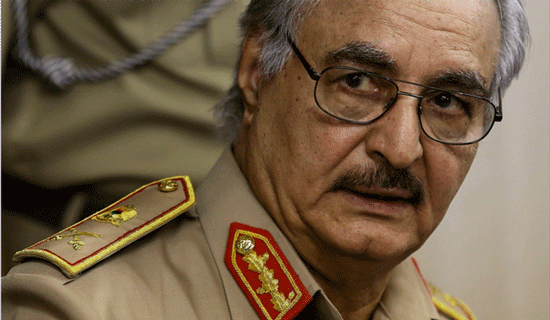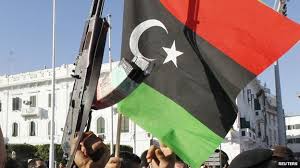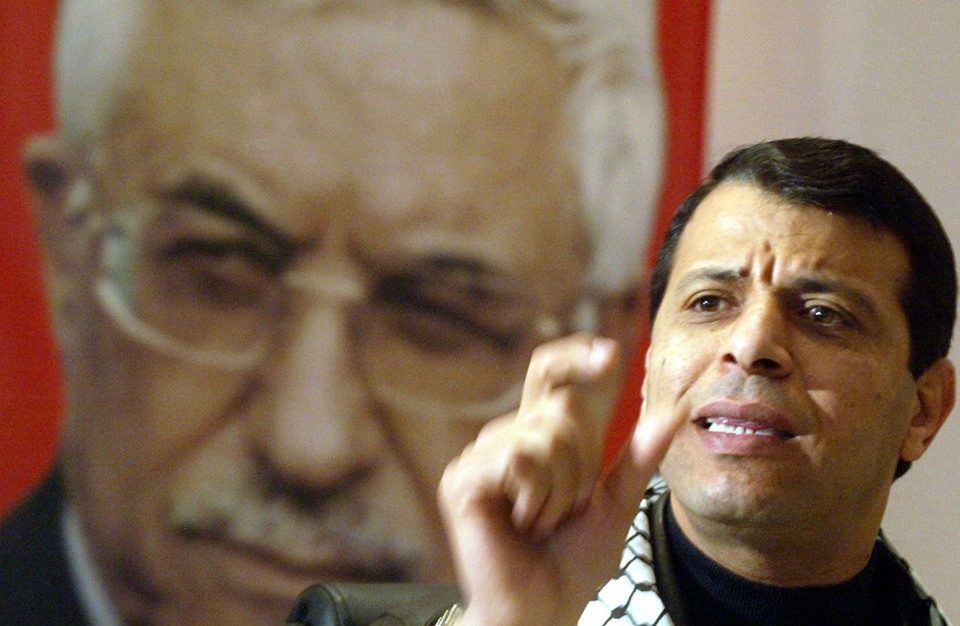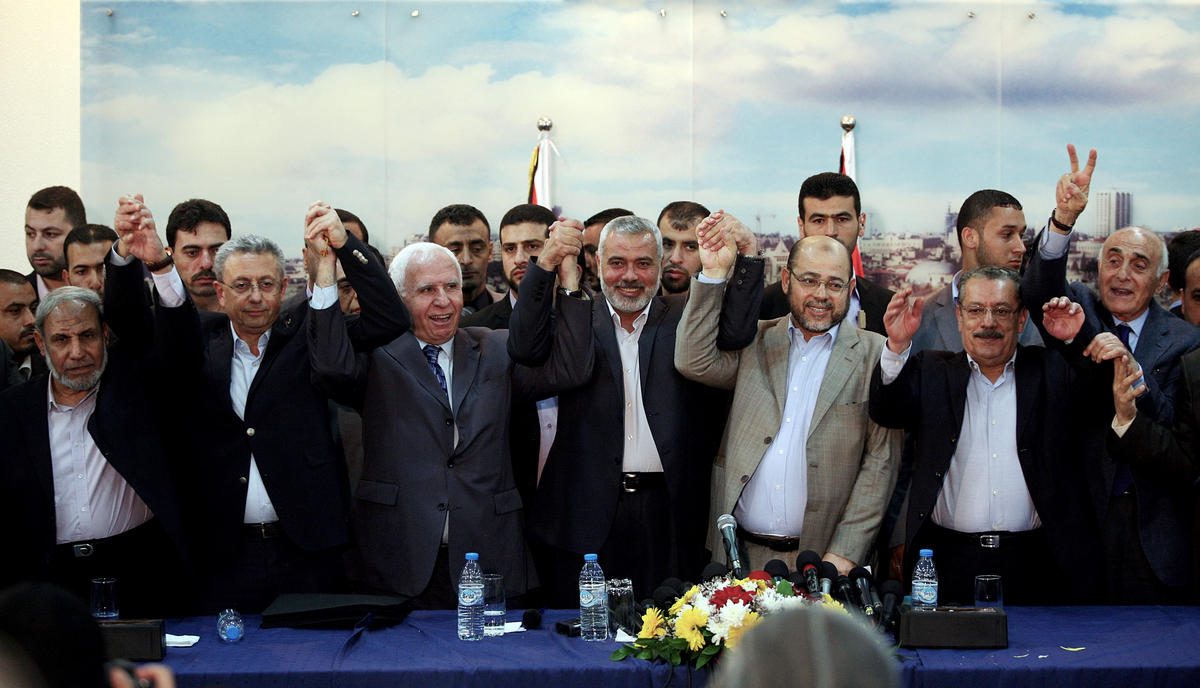
The situation in Libya is heading for escalation between the rival Libyan governments and their militias. A report titled:”Libya’s Future and Haftar’s Oil Grab” written by Karim Mezran and Mattia Toaldo and published by the Atlantic Council stated that a possible military confrontation would break out between the UN-backed Government of National Accord(GNA) and the Libyan National Army(LNA), loyal to General Khalifa Haftar, which has recently seized key oil ports .
Haftar is supported by the House of Representatives (HoR), Tobruk parliament and of the government headed by Abdullah al-Thinni seated in al-Bayda. Moreover, Haftar has been encouraged by strong support from Egypt and the United Arab Emirates (UAE) to launch his bid to take control of as much Libyan territory as possible. A recently leaked air control recordings have revealed that UAE fighters have taken part in operations in Benghazi supporting Khalifa Haftar as reported by MEE.
In fact, Haftar has used the battle for the liberation of Benghazi from “terrorists” as an opportunity, with full Egyptian support, to strengthen his forces. As long as the battle in Benghazi escalates, albeit confined to some neighborhoods only, a justification existed for the support in arms, equipment, and training he received from Egypt and the UAE. But, in reality, part of this support extends also toward enabling Haftar’s troops to reach a level of effectiveness to empower them to reinforce their control over Eastern Libya and launch a sudden offensive to conquer the oil installations of the Gulf of Sidra.
The plan started as Haftar started extending his power in the east with the assistance of the Egyptian Armed Forces. The first move, taken by Haftar in the east, was when the mayor of Benghazi, the largest city in eastern Libya, was replaced by Colonel Ahmed Larabi and the council was suspended. The appointment was made by the Chief of Staff of Gen. Haftar’s army Abdel Razek Al-Nazoury.
Later, Al-Nazoury took the second move when he replaced the mayor of Ajdabiya, Salim Jodran, brother of the head of the Petroleum Facilities Guard (PFG) Ibrahim. He was replaced by retired colonel Embarek Al-Manafi, as commander. Al-Manafi is a supporter of Haftar’s Operation Dignity launched in May of 2014 to clear Libya of Islamists, which also includes the militia groups supporting the UN-backed Government of National Accord (GNA). Now Al-Nadhouri has acted a third time replacing the elected mayor of Al-Kufra by Colonel Saleh Al- Zarrouq.
In alignment with Gen. Haftar’s moves in the east, Egypt’s Armed Forces have been mandated to protect the joint borders from the sea to the Libyan-Sudanese borders. Haftar requested the Egyptian army to protect Libyan/Egyptian borders from Imsaad, in the north, to the Libyan/Sudanese borders, as well as the maritime boundaries between both countries, “meaning that Haftar has granted Egypt unprecedented authority on Libyan territory,” said Libya Prospect.
Moreover, the oil tankers transporting Libyan petrol from Haftar-controlled regions in the east will be under Egypt’s authority in practice, the oil tankers will only be able to carry the oil and export unless Cairo approves.
After all these steps Haftar’s forces took control of oil ports in Libya as the majority of Libya’s oil exports went through the three terminals.
Two years ago, a militia known as Petroleum Facilities Guards controlled by Ibrahim Jadhran, the regional commander of the Petroleum Facilities Guards (PFG),seized the oil ports about two years ago.
Recently Jadran, who many Libyans see as a blackmailer of many governments, recognized the GNA’s authority in exchange for a large sum of money, and thus was posed to impede Haftar’s expansion toward the Gulf of Sidra.
However, the LNA attack has been largely successful and, as of September 12, Haftar is in control of most of Libya’s oil, having reportedly seized the ports of Ras Lanuf, Es Sidra, and Zueitina. While Jadran and his allies (first of all the GNA’s Minister of Defense Mehdi Bargathi) are preparing to launch a counter-attack, their hold on these installations has been severely compromised by Haftar’s operation.
UN Security Council Resolution 2278 explicitly “condemns attempts to illicitly export crude oil from Libya, including by parallel institutions which are not acting under the authority of the Government of National Accord” and sets up a mechanism by which the GNA can ask for external help in enforcing this rule.In other words, oil can only be sold legally by the National Oil Company (NOC) led by Abdullah Sanallah and headquartered in Tripoli.
“Therefore, Haftar’s conquest of the oil ports is a political maneuver as it does not immediately translate into a revenue-making asset. Instead, the purpose of Haftar’s offensive, is to seize resources from the reach of Fayez aL-Serraj’s government, to prevent its further establishment, and to destabilize the coalition of armed groups that support it by eliminating Jadhran,” according to the Atlantic Council report.
As a result, Haftar is now in a ” position of force” in which he can dictate the terms of his role in the future of Libya,according to the report. He could, if he wanted, negotiate with al-Serraj and his western supporters.Now Haftar -thanks to UAE and Egypt’s support- has territorial control over large parts of the eastern province, control over most of the oil resources and ports, a much better equipped and trained armed force under his command and power.
The first reactions by al-Serraj and some international actors may be inclined towards direct confrontation against Haftar. Serraj has instructed his minister of defense to organize the troops under his control to mount a counteroffensive and reconquer the oil installations.
It is hard to say whether the forces that support the GNA, mainly the militias of the city of Misrata, will engage in battle against Haftar’s troops. Misrata’s forces have been engaged in a bloody fight to expel Islamic State(IS) militants from the city of Sirte. While they secured a victory on the ground, it comes at a heavy cost in terms of casualties.
Accordingly, “It is hard to imagine that the city’s population would have the will to endure another military campaign, this time against other Libyan forces,” said the report. “Very little good would come from a counter-escalation while further fighting could create more damage and deprive the country of funds that are essential to the reconstruction of hospitals, schools, and public infrastructure.”
The report recommends that the United States and its European allies should continue to stand against any sale of oil that does not come from the recognized National Oil Company. This isn’t about leaning towards one actor or the other, but about “building the conditions for de-escalation through a deal on oil revenues.”
The report highlights that Haftar may manage to control some oil installations but without the NOC, he cannot legally sell any oil and therefore needs an agreement with the GNA in Tripoli. This agreement would confirm that” oil resources belong to all Libyans and not to those who control them militarily, while avoiding the disastrous eventuality of a direct military confrontation.”
A strong stance by the United States and Europe on the enforcement of UNSCR 2278 would make this deal more likely, yet this strong stance is not foreseeable. European special forces supported Haftar’s troops against jihadists in Benghazi and Misratan forces against ISIS in Sirte.” This will probably prevent them from openly and militarily taking a stand perceived as favoring either contender. Yet, preserving the “neutrality” of oil in Libya would be a big driver for de-escalation, which should be an interest of everyone.”
This stance would open the way for a wider project of which reconciliation between different cities, tribes and social groups should be the centerpiece. Oil has been the main cause of war until now in Libya. In order for it to start being used to bring peace, a new social contract on the redistribution of oil revenues is necessarily crucial . This would also address the legitimate requests of many of Haftar’s supporters.



